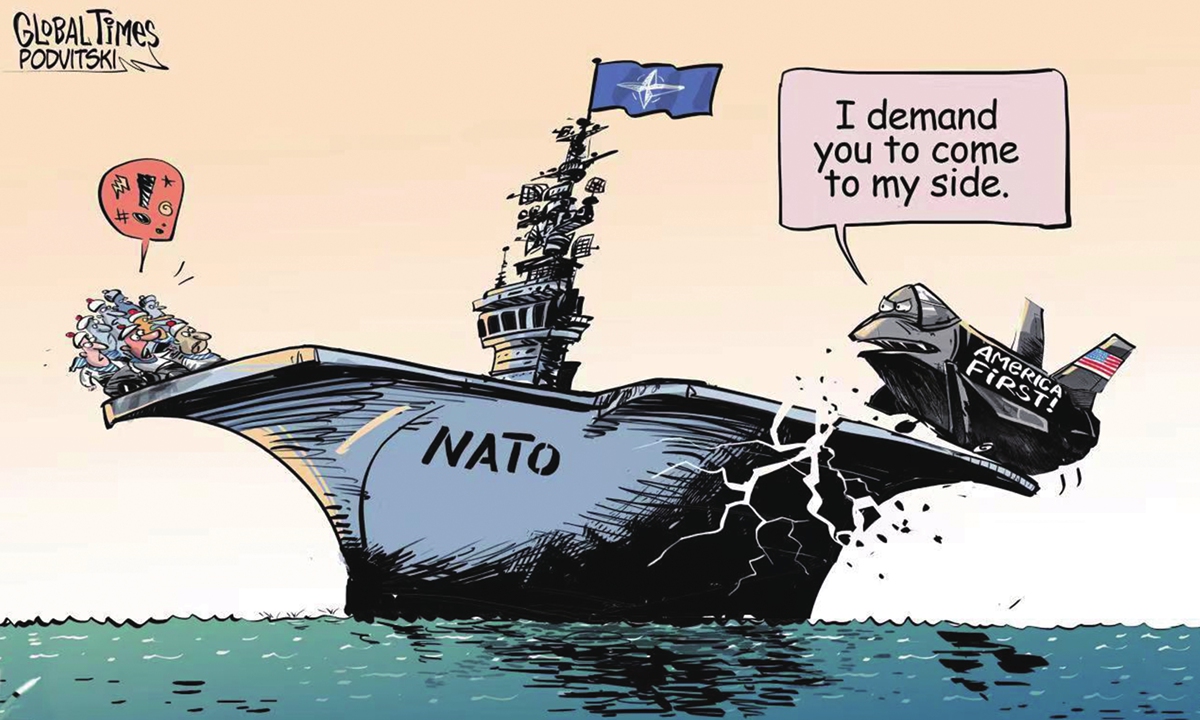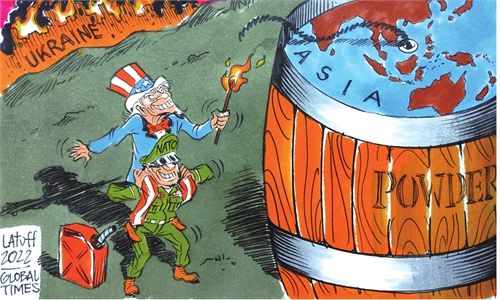
NATO alliance shows cracks under a weakening US leadership. Illustration: Vitaly Podvitski
Editor's Note:
NATO, which is constantly looking for imaginary enemies and justifying its existence by inciting confrontation, is holding a summit from Tuesday to Thursday, and it also plans to extend its tentacles to the Asia-Pacific region. Behind its aggressive narrative, contradictions and divisions within NATO have become increasingly prominent. The Russia-Ukraine conflict is not going according to NATO's playbook. This series of articles will provide some clues regarding NATO's predicament.
In the sixth and last piece, Global Times (GT) reporter Yan Yuzhu talked to Dr. Jenny Clegg (Clegg), a UK-based senior lecturer in Asia-Pacific studies, peace and anti-war activist, and author of China's Global Strategy: Towards a Multipolar World, about Europe's attitude toward NATO and the problems exposed, what the US has been pushing Europe to do under the NATO framework, and the potential crisis in the Asia-Pacific region.
GT: Initially, the Russia-Ukraine crisis was seen by public opinion as a conflict that would strengthen NATO unity. But as the conflict drags on, differences within NATO have been increasingly exposed. As several European leaders have mentioned "Ukraine fatigue," there are even voices suggesting that Kiev "will have to make some territorial concessions to Moscow to end the current conflict." Does this conflict reveal more of NATO's dilemmas?
Clegg: I think that things are quite up in the air. We've seen some major changes and shifting attitudes toward militarization in Europe, weakening or really eradicating some of the pillars for peace that were set in place from the end of World War II.
For example, we've seen big shifts in Germany in agreeing to send arms to conflict areas. We've seen the ending of neutrality of Sweden and Finland who both want to join NATO now. And we can remember that Trump was really disparaging about NATO and demanded the 2 percent of GDP military spending. But at that time, Europe was quite reluctant to do this. So we've seen that barrier being broken down, and Germany committed earlier in the conflict to 100 billion euros in military spending.
We've seen quite a shift in Europe, and it remains to be seen how this is going to work out. The Europeans pushed through a raft of measures very rapidly, for example, more or less immediately ending plans for Nord Stream 2. At the same time, we saw a lot of diplomatic activities, particularly on the part of Macron, who was speaking to Putin, but it's really Biden and Johnson that have pushed the situation to become a proxy war between NATO and Russia and risk all the time a direct confrontation drawing NATO in. They've been pushing countries to commit to the supply of weapons. But as you say in the last few weeks, we're seeing some divergence over what the "endgame" of this actually is with people like Biden and Johnson insisting on the defeat and weakening of Russia, the overthrow of Putin, with Macron saying, no, we mustn't humiliate Russia.
We've seen Italy putting forward a peace proposal, with a high degree of autonomy for the Donbas region. So I think that this question of the "endgame" is still very much a matter of debate within NATO, with Biden and Johnson pushing for more sanctions and arms, demanding no negotiations with the "butcher of Russia," and some of the Europeans still looking for another outcome.
GT: The consequences of the Russia-Ukraine conflict are likely to be increasingly serious and European countries are bearing considerable losses, such as soaring energy prices and inflation. Do you think that the "security threat posed by Russia," as promoted by NATO, is convincing to European societies?
Clegg: It does seem as if the sanctions are hurting Europe more than expected. They committed to banning 90 percent of Russian oil imports by the end of the year. Also, the squeezing of gas supplies will hit Germany and Italy very hard. Russia's action - its previous takeover of Crimea, and before that, its action against Georgia - surely is unsettling for its neighbours. But to view NATO as a defensive organization can't be sustained when NATO has launched wars in the Middle East, and it has a policy of the first use of nuclear weapons.
Basically, I think the problem for Europe is that it has surrendered its strategic thinking to NATO and the US, and has really abnegated any serious foreign policy beyond economic relations. It's been happy to trade with the rest of the world, but not to do any of the hard strategic thinking. Macron has talked about the idea of strategic autonomy, but is European autonomy really possible when it doesn't have a foundation in its defense industry?
Another thing is that Europe has forged the idea of its civilization or superiority on the issue of human rights. It's constantly in a dilemma over questions of commercial interest vs liberal ideals. Europe has really been caught in this dilemma of it's old transatlanticism and the prospects of a long-term rebalancing toward Eurasia, and Europe has been found wanting. It's not prepared to radically rethink its positioning and stay away from reliance on NATO for its defense and security.
GT: The economy is the primary political issue in any country. How do you think, for example, in the UK, voters will influence the diplomacy of their leaders? If the economic situation continues to deteriorate, what impact will it have on the direction of the Russia-Ukraine conflict?
Clegg: Indeed, you think that the economy would be the primary political issue, but don't forget when you're talking about the UK you're talking about a country that voted for Brexit. Politics is not necessarily rational, and it's becoming more and more clear that Brexit is a factor now in why Britain is the worst performing G20 country apart from Russia.
I'd also secondly query this notion of leaders. I think that we're led by a bunch of crooks and cheats and liars. Having said that, certainly here in the UK, we're facing a summer of discontent. We've had strikes during the week by rail workers, which will be followed by strikes of British airways workers. And then this week we're also looking toward decisions of teachers, health workers, postal workers. Indeed, it seems that at the moment, public opinion is quite sympathetic. There was a report this week that suggested that nearly half of households in this country are cutting back on food purchases. Inflation was rising as we were coming out of the pandemic. But looking ahead, the overall situation could get even worse if Russia cuts energy supplies to Europe. However, in terms of the discussion about the cost of living crisis and inflation in this country, there's not much linkage between the inflation and the war situation.
Our so-called leaders, like Liz Truss, have been trying to tell us that we need to "tighten our belts," and this is the "price of freedom." It's very heartening that we have some good trade union leaders, but they're not political leaders and they have to be very careful in terms of what they say. As far as changing Britain's foreign policy in any fundamental way, this is an extremely tough task. Anything to do with the diminishing of Britain's global status is just impossible to talk about. We still have been in the grip of a colonial mindset. Now the Tory government has embraced the idea of "Global Britain" now that we're free of Europe. This is built on the bedrock of the special relationship with the United States.
As I say, changing our foreign policy in any fundamental way is a very tough task. If, however, the government goes to the country anytime soon with a request for increasing military spending, I think that will really sharpen the contradictions. We may have even further protests and a politicization of the cost of living crisis.
GT: After the NATO Summit in 2021, the organization adopted NATO 2030, which explicitly identifies China as a "systemic challenge" to NATO. Since then, how has NATO acted on dealing with China? Does this statement prolong NATO's life?
Clegg: The US has been pushing NATO toward its so-called free and open Indo-Pacific agenda, and it's been doing so step by step to persuade the European NATO members to face up to, what they've determined is, the "China challenge." And we can see that they've done so with quite a certain amount of circumspection. For example, first of all, they've been pushing on a commitment to freedom of navigation which NATO committed to two or three years ago. We've seen NATO members, as a result, taking part in military exercises with the UK, France and Germany sending warships into the South China Sea. They also pushed for a ban on Huawei, and Europe has been somewhat resistant to this. But I think that they will continue to push their agenda by drawing countries into their proposals on hybrid war, as I've suggested. It remains to be seen how the summit shapes up in continuing to shift the perceptions of threat as seen from the European members of NATO.
GT: Many believe that NATO will replicate the Ukraine crisis in the Asia-Pacific region and drag China down and that the potential "Asian Ukraine" could be Japan, South Korea, or the Taiwan island. What do you think? Is it likely that the Ukraine crisis will be replicated in the Asia-Pacific?
Clegg: We have a new Prime Minister in Japan who sent offerings to the Yasukuni Shrine. So we have an indication of the kind of persisting attitudes that are amongst the elites in Japan. Again, After all, despite the drama and fanfare when Trump took a little step over into the border, absolutely nothing has happened, which is extremely frustrating for the North Koreans. Let alone now South Korea has a more hardline government.
I think that most attention has been directed toward the question of Taiwan, and it's very clear here that the US is coy with the one-China policy so as to aggravate China. China has made clear that it seeks a peaceful reunification with the island, but it has identified three red lines.
First of all, it will take action if Taiwan declares independence; it will take action if negotiations on peaceful reunification are blocked, there's no way forward; and it will take action if there's a major incident. What a major incident would consist of remains to be seen. Clearly, as there are more military activities with the US becoming more militarily involved in Taiwan, there are always the dangers of an accident. It seems that from recent reports that I've heard, that the expectations among some people in Taiwan island that the US would intervene militarily in the case of a conflict with Chinese mainland have completely collapsed following the Ukraine crisis.
In that respect, China can bide its time. But clearly, the US is determined to draw a straight line from Russia to China using the Ukraine crisis as a lever, and claiming to build a new alliance of democracies which will be prepared to take a stand on Taiwan island.
They've tried to draw parallels between Ukraine and Taiwan, which are completely different situations, because Ukraine is an independent country, and Taiwan is a part of China. The US in talking about a rules-based world order is really looking for that rules-based order to declare that only democratic entities are legitimate. I think that's how they're trying to build the case around Taiwan.

